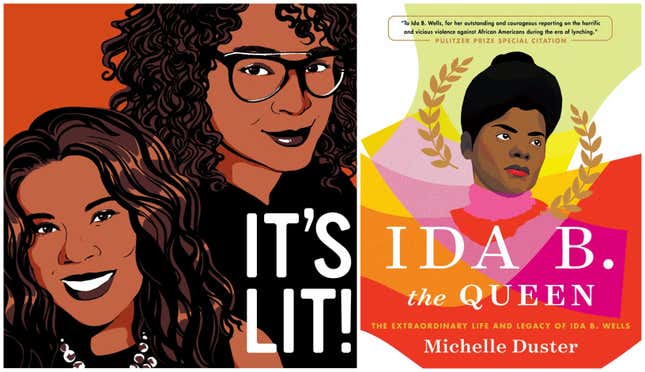
What does it feel like to be heir to a renowned legacy? For Michelle Duster, great-granddaughter of Ida B. Wells, it has meant commemorating the life of the revered activist, educator and journalist in the towns she once called home—including her adopted home of Chicago—as well as preserving the writings of Wells, which she’s previously done in two books: Ida in Her Own Words and Ida From Abroad. Now, Duster is introducing her incredible ancestor to a new audience in the gorgeously illustrated young-adult book Ida B. the Queen: The Extraordinary Life and Legacy of Ida B. Wells, a remarkable look at Wells’ life, early influences and enduring impact that reminds us we are all heirs to her legacy of activism.
“Obviously, I’m very appreciative of having this amazing legacy—and I don’t take it for granted that I come from,” Duster tells us on this week’s episode of The Root Presents: It’s Lit! timed perfectly for our celebration of Black HerStory Month. “You know, I’m descended from somebody who was so well admired and inspiring to so many people, and people could have their own explanations on why I personally have been attracted to this type of work, because it wasn’t like I was forced to or that I felt any kind of pressure to,” she further explains, noting that she is one of 18 of Wells’ great-grandchildren. “So some people want to say, ‘Why are you following your great grandmother’s footsteps?’ I’m like, ‘Really? Why isn’t everybody else?’”
Truly, those of us who are journalists owe a special debt to Ida B. Wells, who pioneered investigative reporting, and deeply inspired our podcast’s inaugural guest, Nikole Hannah-Jones, who also co-founded the Ida B. Wells Society For Investigative Reporting. Hannah-Jones memorably received her Pulitzer Prize for The 1619 Project the same year Wells received a well-deserved (and long-overdue) posthumous one; indicating a direct through-line between the journalistic trailblazer and the world of possibilities she opened for the Black women who walked in her stead.
Though she never met her great-grandmother, as a direct descendant, it might seem Duster would naturally be one of those aforementioned women—and she is indeed a seasoned writer, educator and activist in her own right. But what is perhaps more remarkable is how Duster blazed her own path into the world and a creative career—a story told alongside Ida’s—and found herself coming full circle into a path that in many ways echoes her elder.
“There’s something about my own personal interest that has led me to want to make a difference when it comes to telling the stories of the African-American experience in ways that I think are more truthful and more encompassing of our entire experience, because we are a multidimensional group of people,” says Duster, adding:
People will see certain things in the news and they’ll see certain things in TV and movies or whatever kind of mediums that we’re looking at and think that they know something about Black people based on only what they see because they don’t know anybody. They’ve never met anybody or they’ve had no close relationships with anybody Black. And so they’re getting their ideas from outside sources. And I think that those sources are skewed towards the negative disproportionately. And so I care. I care about making an impact, making some kind of difference in shaping those narratives. So that who we are as a people can be depicted in ways that I feel are more balanced and more realistic.
Learn more from the determined Michelle Duster in Episode 25 of The Root Presents: It’s Lit!: Talking Ida B. and Queen Tings, With Michelle Duster, available on Apple, Spotify, Stitcher, iHeart Radio, Google Podcasts, Amazon, NPR One, TuneIn, and Radio Public. Also available is a transcript of this week’s episode.

